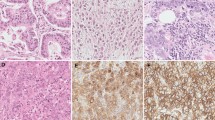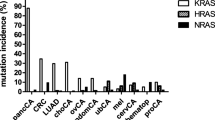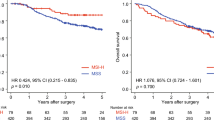Abstract
Objective
To investigate whether polymorphisms in ERCC1, XPD, XPG, XRCC1 genes are associated with clinical outcomes in advanced gastric cancer (AGC) patients treated with oxaliplatin-based chemotherapy.
Methods
The genetic polymorphisms in ERCC1, XPD, XPG, XRCC1 were determined in 94 advanced gastric cancer patients treated with oxaliplatin-based chemotherapy, using TaqMan-MGB probes. The clinical response of 60 patients with stage IV disease, time to progression (TTP) and overall survival (OS) of 94 patients were evaluated.
Results
The overall disease control rate (CR + PR + SD) of the 60 patients in stage IV was 70% (42/60). Patients with XRCC1 399 G/G, XPG 46 C/C genotypes showed enhanced response to the oxaliplatin-based chemotherapy compared to those with other genotypes (P < 0.05). The median OS and TTP of the patients were 5.5 months and 9.0 months, respectively. Among the 4 types of polymorphisms in the study, XRCC1 399 G/A + A/A, XPG 46 C/T + T/T genotypes were regarded to be associated with chemoresistance and poor survival (P < 0.05). Combination analysis of the 2 polymorphisms using the Kaplan-Meier method revealed that the TTP and OS of the patients with a number of risk genotypes were significantly shortened (P < 0.05). No significant association was found between the genotypes of the XPD codon 751, the ERCC1 codon 118 and the clinical outcome (P > 0.05).
Conclusion
Testing for XRCC1 399, XPG 46 polymorphisms may allow identification of the gastric cancer patients who will benefit from oxaliplatin-based chemotherapy. Specific polymorphisms may influence clinical outcomes of AGC patients. Selecting specific chemotherapy based on pretreatment genotyping represents an innovative strategy that warrants prospective studies.
Similar content being viewed by others
References
Parkin DM, Bray F, Ferlay J, et al. Global cancer statistics, 2002. CA Cancer J Clin 2005; 5: 74–108.
Kamangar F, Dores GM, Anderson WF. Patterns of cancer incidence, mortality, and prevalence across five continents: defining priorities to reduce cancer disparities in different geographic regions of the world. J Clin Oncol 2006; 24: 2137–2150.
Wagner AD, Grothe W, Haerting J, et al. Chemotherapy in advanced gastric cancer: a systematic review and meta-analysis based on aggregate data. J Clin Oncol 2006; 24: 2903–2909.
Cunningham SC, Schulick RD. Palliative management of gastric cancer. Surg Oncol 2007; 16: 267–275.
Nishiyama M. Chemotherapy for gastric cancer in Japan. Int J Clin Oncol 2008; 13: 191–192.
Van Cutsem E, Van de Velde C, Roth A, et al. Expert opinion on management of gastric and gastro-oesophageal junction adenocarcinoma on behalf of the European Organisation for Research and Treatment of Cancer (EORTC)-gastrointestinal cancer group. Eur J Cancer 2008; 44: 182–194.
Sadighi S, Mohagheghi MA, Montazeri A, et al. Quality of life in patients with advanced gastric cancer: a randomized trial comparing docetaxel, cisplatin, 5-FU (TCF) with epirubicin, cisplatin, 5-FU (ECF). BMC Cancer 2006; 6: 274.
Sumpter K, Harper-Wynne C, Cunningham D, et al. Report of two protocol planned interim analyses in a randomised multicentre phase III study comparing capecitabine with fluorouracil and oxaliplatin with cisplatin in patients with advanced oesophagogastric cancer receiving ECF. Br J Cancer 2005; 92: 1976–1983.
Van Cutsem E, Moiseyenko VM, Tjulandin S, et al. Phase III study of docetaxel and cisplatin plus fluorouracil compared with cisplatin and fluorouracil as first-line therapy for advanced gastric cancer: a report of the V325 Study Group. J Clin Oncol 2006; 24: 4991–4997.
Ruzzo A, Graziano F, Loupakis F, et al. Pharmacogenetic profiling in patients with advanced colorectal cancer treated with first-line FOLFOX-4 chemotherapy. J Clin Oncol 2007; 25: 1247–1254.
Petty WJ, Knight SN, Mosley L, et al. A pharmacogenomic study of docetaxel and gemcitabine for the initial treatment of advanced non-small cell lung cancer. J Thorac Oncol 2007; 2: 197–202.
Kweekel DM, Gelderblom H, Guchelaar HJ. Pharmacology of oxaliplatin and the use of pharmacogenomics to individualize therapy. Cancer Treat Rev 2005; 31: 90–105.
Grothey A, Goldberg RM. A review of oxaliplatin and its clinical use in colorectal cancer. Expert Opin Pharmacother 2004; 5: 2159–2170.
Marsh S. Pharmacogenetics of colorectal cancer. Expert Opin Pharmacother 2005; 6: 2607–2616.
Gurubhagavatula S, Liu G, Park S, et al. XPD and XRCC1 genetic polymorphisms are prognostic factors in advanced non-small-cell lung cancer patients treated with platinum chemotherapy. J Clin Oncol 2004; 22: 2594–2601.
Raymond E, Faivre S, Chaney S, et al. Cellular and molecular pharmacology of oxaliplatin. Mol Cancer Ther 2002; 1: 227–235.
Weaver DA, Crawford EL, Warner KA, et al. ABCC5, ERCC2, XPA and XRCC1 transcript abundance levels correlate with cisplatin chemoresistance in non-small cell lung cancer cell lines. Mol Cancer 2005; 4: 18.
Park DJ, Stoehlmacher J, Zhang W, et al. A Xeroderma pigmentosum group D gene polymorphism predicts clinical outcome to platinum-based chemotherapy in patients with advanced colorectal cancer. Cancer Res 2001; 61: 8654–8658.
Quintela-Fandino M, Hitt R, Medina PP, et al. DNA-repair gene polymorphisms predict favorable clinical outcome among patients with advanced squamous cell carcinoma of the head and neck treated with cisplatin-based induction chemotherapy. J Clin Oncol 2006; 24: 4333–4339.
Isla D, Sarries C, Rosell R, et al. Single nucleotide polymorphisms and outcome in docetaxel-cisplatin-treated advanced non-small-cell lung cancer. Ann Oncol 2004; 15: 1194–1203.
Suk R, Gurubhagavatula S, Park S, et al. Polymorphisms in ERCC1 and grade 3 or 4 toxicity in non_small cell lung cancer patients. Clin Cancer Res 2005; 11: 1534–1538.
Zhou W, Gurubhagavatula S, Liu G, et al. Excision repair cross-complementation group 1 polymorphism predicts overall survival in advanced non-small cell lung cancer patients treated with platinum-based chemotherapy. Clin Cancer Res 2004; 10: 4939–4943.
Tian M, Shinkura R, Shinkura N, et al. Growth retardation, early death, and DNA repair defects in mice deficient for the nucleotide excision repair enzyme XPF. Mol Cell Biol 2004; 24: 1200–1205.
Park DJ, Stoehlmacher J, Zhang W, et al. ERCC1 polymorphism is associated with differential ERCC1 mRNA levels. Proc Am Ass Cancer Res 2002; 43: 321.
Petros WP, Hopkins PJ, Spruill S, et al. Associations between drug metabolism genotype, chemotherapy pharmacokinetics, and overall survival in patients with breast cancer. J Clin Oncol 2005; 23: 6117–6125.
Park DJ, Zhang W, Stoehlmacher J, et al. ERCC1 gene polymorphism as a predictor for clinical outcome in advanced colorectal cancer patients treated with platinum-based chemotherapy. Clin Adv Hematol Oncol 2003; 1: 162–166.
Viguier J, Boige V, Miquel C, et al. ERCC1 codon 118 polymorphism is a predictive factor for the tumor response to oxaliplatin/5-fluorouracil combination chemotherapy in patients with advanced colorectal cancer. Clin Cancer Res 2005; 11: 6212–6217.
Kamikozuru H, Kuramochi H, Hayashi K, et al. ERCC1 codon 118 polymorphism is a useful prognostic marker in patients with pancreatic cancer treated with platinum-based chemotherapy. Int J Oncol 2008; 32: 1091–1096.
Tibaldi C, Giovannetti E, Vasile E, et al. Correlation of CDA, ERCC1, and XPD polymorphisms with response and survival in gemcitabine/cisplatin-treated advanced non-small cell lung cancer patients. Clin Cancer Res 2008; 14: 1797–1803.
Martinez-Balibrea E, Abad A, Aranda E, et al. Pharmacogenetic approach for capecitabine or 5-fluorouracil selection to be combined with oxaliplatin as first-line chemotherapy in advanced colorectal cancer. Eur J Cancer 2008; 44: 1229–1237.
de las Peñas R, Sanchez-Ronco M, Alberola V, et al. Polymorphisms in DNA repair genes modulate survival in cisplatin/gemcitabine-treated non-small-cell lung cancer patients. Ann Oncol 2006; 17: 668–675.
Ryu JS, Hong YC, Han HS, et al. Association between polymorphisms of ERCC1 and XPD and survival in non-small-cell lung cancer patients treated with cisplatin combination chemotherapy. Lung Cancer 2004; 44: 311–316.
Stoehlmacher J, Park DJ, Zhang W, et al. A multivariate analysis of genomic polymorphisms: prediction of clinical outcome to 5-FU/oxaliplatin combination chemotherapy in refractory colorectal cancer. Br J Cancer 2004; 91: 344–354.
Ruzzo A, Graziano F, Kawakami K, et al. Pharmacogenetic profiling and clinical outcome of patients with advanced gastric cancer treated with palliative chemotherapy. J Clin Oncol 2006; 24: 1883–1891.
Keam B, Im SA, Han SW, et al. Modified FOLFOX-6 chemotherapy in advanced gastric cancer: Results of phase II study and comprehensive analysis of polymorphisms as a predictive and prognostic marker. BMC Cancer 2008; 8: 148.
Huang ZH, Hua D, Du X. Polymorphisms in p53, GSTP1 and XRCC1 predict relapse and survival of gastric cancer patients treated with oxaliplatin-based adjuvant chemotherapy. Cancer Chemother Pharmacol 2009 Feb 27 (Epub ahead of print).
Yuan P, Miao XP, Zhang XM, et al. XRCC1 and XPD genetic polymorphisms predict clinical responses to platinum-based chemotherapy in advanced non-small cell lung cancer. Zhonghua Zhong Liu Za Zhi 2006; 28: 196–199 (Chinese).
McLeod HL, Sargent DJ, Marsh S, et al. Pharmacogenetic analysis of systemic toxicity and response after 5-fluorouracil (5FU)/CPT-11, 5FU/ox-aliplatin (oxal) or CPT-11/oxal therapy for advanced colorectal cancer (CRC): Results from an intergroup trial. Proc Am Soc Clin Oncol 2003 (Abstr1013); 22: 253.
Yeh CC, Hsieh LL, Tang R, et al. MS-920: DNA repair gene polymorphisms, diet and colorectal cancer risk in Taiwan. Cancer Lett 2005; 224: 279–288.
Kiyohara C, Yoshimasu K. Genetic polymorphisms in the nucleotide excision repair pathway and lung cancer risk: a meta-analysis. Int J Med Sci 2007; 4: 59–71.
Zienolddiny S, Campa D, Lind H, et al. Polymorphisms of DNA repair genes and risk of non-small cell lung cancer. Carcinogenesis 2006; 27: 560–567.
Saldivar JS, Lu KH, Liang D, et al. Moving toward individualized therapy based on NER polymorphisms that predict platinum sensitivity in ovarian cancer patients. Gynecol Oncol 2007; 107(1 Suppl 1): 223–229.
Monzo M, Moreno I, Navarro A, et al. Single nucleotide polymorphisms in nucleotide excision repair genes XPA, XPD, XPG and ERCC1 in advanced colorectal cancer patients treated with first-line oxaliplatin/fluoropyrimidine. Oncology 2007; 72: 364–370.
Kiyohara C, Takayama K, Nakanishi Y. Association of genetic polymorphisms in the base excision repair pathway with lung cancer risk: a meta-analysis. Lung Cancer 2006; 54: 267–283.
Stern MC, Siegmund KD, Conti DV, et al. XRCC1, XRCC3, and XPD polymorphisms as modifiers of the effect of smoking and alcohol on colorectal adenoma risk. Cancer Epidemiol Biomarkers Prev 2006; 15: 2384–2390.
Hirata H, Hinoda Y, Tanaka Y, et al. Polymorphisms of DNA repair genes are risk factors for prostate cancer. Eur J Cancer 2007; 43: 231–237.
Suh KW, Kim JH, Kim do Y, et al. Which gene is a dominant predictor of response during FOLFOX chemotherapy for the treatment of metastatic colorectal cancer, the MTHFR or XRCC1 gene? Ann Surg Oncol 2006; 13: 1379–1385.
Bewick MA, Conlon MS, Lafrenie RM. Polymorphisms in XRCC1, XRCC3, and CCND1 and survival after treatment for metastatic breast cancer. J Clin Oncol 2006; 24: 5645–5651.
Wu X, Gu J, Wu TT, et al. Genetic variations in radiation and chemotherapy drug action pathways predict clinical outcomes in esophageal cancer. J Clin Oncol 2006; 24: 3789–3798.
Author information
Authors and Affiliations
Corresponding author
Additional information
This work was supported by a grant from the Natural Science Foundation of Shandong Province, China (No.Y2008C126).
About this article
Cite this article
Jiang, J., Liang, J., Yao, R. et al. Polymorphisms of ERCC1, XPD, XRCC1 and XPG predict clinical outcome in advanced gastric cancer patients receiving oxaliplatin-based chemotherapy in Chinese population. Clin. Oncol. Cancer Res. 6, 328–336 (2009). https://doi.org/10.1007/s11805-009-0328-z
Received:
Accepted:
Published:
Issue Date:
DOI: https://doi.org/10.1007/s11805-009-0328-z




